
Guests
- Glenn Carleserved 23 years in the Clandestine Services of the Central Intelligence Agency. His book, The Interrogator: An Education, has just been published and tells the story of one of the most secret and sensitive CIA interrogations during the U.S. war on terror.
- Juan Coleprofessor of history at the University of Michigan. His blog, “Informed Comment,” is online at JuanCole.com. His most recent book is Engaging the Muslim World.
Former top CIA counterterrorism officer Glenn Carle has revealed the Bush administration sought damaging personal information on Juan Cole, an academic and prominent critic of the Iraq war, in an attempt to discredit him. Carle says the Bush White House made at least two requests for intelligence about Cole, whose blog “Informed Comment” rose to prominence after the Iraq invasion. Carle refused to carry out the request. In a joint interview, Carle and Cole join us to discuss the explosive revelation and why Cole is now calling for a congressional investigation. “I think I was targeted because this was a propagandistic administration … full of people who thought they could pull the wool over the American people’s eyes,” says Cole. “The Bush administration was starkly at odds with the intelligence community as a whole—the CIA, in particular, and the National Intelligence Council even more so,” Carle says. “I do know the context of tension and hostility between the Bush administration and the intelligence community, and more broadly, any critic of their policies.” [includes rush transcript]
Transcript
AMY GOODMAN: The New York Times has reported the Bush administration sought damaging personal information from the CIA on Juan Cole, an academic and prominent critic of the Iraq war, this in an attempt to discredit him. According to former top counterterrorism officer Glenn Carle, the Bush administration made at least two requests for intelligence about Cole, a Middle East expert and professor at the University of Michigan. Juan Cole has been a frequent guest on Democracy Now!. He maintains the popular blog “Informed Comment,” which rose to prominence after the Iraq invasion.
Carle refused to carry out the request to destroy Juan Cole. A CIA spokesman denied Carle’s account. Legal experts say the spying on Cole would violate federal laws barring CIA spying and data collection on U.S. citizens. Professor Cole is now calling for a congressional investigation into the Bush administration’s efforts to discredit him.
We go now to Washington, D.C., to talk to Glenn Carle, who served 23 years in the Clandestine Services of the Central Intelligence Agency. He’s just written a new book. It’s called The Interrogator: An Education. It tells the story of one of the most secret and sensitive CIA interrogations during the U.S. war on terror.
We’re also joined from Amsterdam by Juan Cole himself, professor of history at the University of Michigan. His blog, “Informed Comment,” is online at JuanCole.com. His most recent book is Engaging the Muslim World.
Professor Cole, when did you get word of, get wind of what the Bush administration was trying to do to you?
JUAN COLE: It was in—roughly in mid-February when the national security correspondent, James Risen, at the New York Times called me for reaction to the story.
AMY GOODMAN: And what did he lay out to you, and what is your reaction?
JUAN COLE: Well, he laid out for me the account that he had gathered, as I understand it, not only from Mr. Carle, but from a number of sources inside the CIA or, for all I know, retired operatives. And he explained that they told him that there was more than one attempt to get analysts at the CIA to discredit me, to look for any information that would destroy my reputation.
AMY GOODMAN: And what is your response to this, Professor Cole?
JUAN COLE: Well, it’s outrageous. It’s actually—Amy, it’s so discouraging that—you know, we’ve been through this picture before, you and I. We saw this in the late ’60s and the ’70s when the CIA was deployed in COINTELPRO against anti-Vietnam War activists. And Nixon, of course, misused the agency for his own purposes. And the Congress looked into these abuses, and it passed reforms, and it—you know, it passed another sets of legislations about it. You know, the CIA charter itself, from the beginning, forbade this kind of thing.
And I think most of the analysts and the field officers and the directorate of operations are pretty straight arrows. I don’t think that this is a common kind of thing. But from Mr. Carle’s account, it seems fairly clear that it wasn’t so hard for whoever it was in the White House that issued this order to convince people at the CIA to undertake this thing. I mean, and Mr. Carle did the right thing: he said no, and moreover, this is dangerous to the reputation of the agency. But there were others who were willing to cooperate.
AMY GOODMAN: Well, let’s turn to Glenn Carle. We have him in Washington, D.C., in a studio, served 23 years in the Clandestine Services of the Central Intelligence Agency.
Welcome to Democracy Now!, Glenn. Can you talk about exactly when you were approached, where you were and what you said?
GLENN CARLE: Yes, good morning. Thank you.
It was—the exact date I don’t recall, but I think it was sometime late in 2005, as best I can reconstruct the calendar. I was asked by my superior if I knew who Professor Cole was. I responded, “Yes, he worked for the National Intelligence Council, where I was serving as the deputy national intelligence officer for terrorism, essentially, at the time.” And then the question was, “Well, the White House wants—what do you know about him personally?” His lifestyle type of questions and practices. “Because the White House wants to get him.” And I was just flabbergasted.
I would like to add to Professor Cole’s comment that I think it’s even more than the overwhelming majority—or, I don’t remember exactly his words. It’s part of the culture in CIA, it’s part of our oath and our training, that the CIA has nothing to do with American citizens. It was just flabbergasting.
AMY GOODMAN: So, did you know Professor Cole or know of him at the time you were asked? And can you go on from there? What happened when you said you wouldn’t do this? And who was it who demanded this information from you, said that you should get information?
GLENN CARLE: Well, I did know Professor Cole. He was one of a large number of experts of diverse views that the National Intelligence Council and my office and the CIA respectively consult with to challenge our assumptions and understand the trends and issues on our various portfolios. So I knew him that way. And it was sensible, in that sense, that the White House turned to my office to inquire about him, because we were the ones, at least one of the ones—I don’t know all of Mr. Cole’s work—who had consulted with him.
I never have mentioned anybody’s names in this process. I was approached out of the blue by the New York Times with the story. You know, when they said they were running the story and “We understand, Mr. Carle, that you were involved in the following issue and steps,” I reflected for a moment, and they had basically the truth. And it was important. It wasn’t touching upon sources and methods of the CIA, which of course I can’t talk about. And so, I thought, well, it’s important, it’s true, and I am a player in this, and so I then acknowledged that they basically had the story right.
AMY GOODMAN: Well, the way James Risen writes it, he says, “Mr. Carle said [that] sometime that year, he was approached by his supervisor, David Low, about Professor Cole. [Mr.] Low and [Mr.] Carle have starkly different recollections of what happened. According to Mr. Carle, [Mr.] Low returned from a White House meeting one day and inquired who Juan Cole was, making clear [that] he wanted [Mr.] Carle to gather information on him. Mr. Carle recalled [his] boss saying, 'The White House wants to get him.'”
GLENN CARLE: Well, that’s substantially correct. The one nuance, perhaps, I would point out is there’s a difference between collecting information actively, going out and running an operation, say, to find out things about Mr. Cole, or providing information known through interactions. I would characterize it more as the latter. Nonetheless, it’s simply not acceptable for the CIA to have anything to say to the White House or to anybody about an American citizen. And that’s how the initial approach occurred. It’s simply a fact.
AMY GOODMAN: Risen goes on to write in the New York Times that you “immediately went to see David Gordon, then the acting director of the council. Mr. Carle said [that] after he recounted his exchange with Mr. Low, Mr. Gordon responded [that] he would 'never, never be involved in anything like that.'” Then describe what —
GLENN CARLE: That —
AMY GOODMAN: Is that right?
GLENN CARLE: Yeah, that—I’m sorry to interrupt you. That’s exactly correct. I was intensely disturbed by this. And it’s almost inconceivable that anybody in the CIA would do something like this. That’s why it’s so hard to imagine. But it did happen. And because I was so disturbed, I immediately did go to the acting chairman of the National Intelligence Council, a man I knew to be of judgment and whose professional background I had full confidence in, and I told him what disturbed me. And he replied, responded to me just as you said. He said that he would never, ever have anything to do with that, and he would take care of it, which is why I saw him.
AMY GOODMAN: Now, what happened next is very interesting. “Mr. Low was not at work the next morning,” writes James Risen. “But on his way to a meeting in the C.I.A.’ s front office, a secretary asked if he”—that’s you, Glenn Carle—”would drop off a folder to be delivered by courier to the White House. Mr. Carle said he opened it and stopped cold.” What was inside that envelope, the memo?
GLENN CARLE: Yes, that’s correct. I was—the following day, I came to work and was asked to represent my office at the senior staff meeting, which is routine. And I did. And it was also routine that I take a memorandum of some sort up to the front office, I believe, for the White House. And I thought that I should know what I was doing for the morning, and I read the memo, and it was a memo on Professor Cole with four paragraphs, as I recall, only one of which was about inappropriate personal information. The other three struck me as innocuous. I don’t remember specifically what they said, but one of the four.
So, I fortunately had a few minutes before the start of the staff meeting, and I immediately went once again to the acting chairman of the National Intelligence Council and said, “You need to see this, and you need to do something about it.” And he saw it, and he said, more or less, “Well, watch this.” And he took a red pen, actually, and actively scratched out the offending paragraph. And he said, “OK?” And I said, “Yes, that’s why I brought it to you.” He said, “I will take care of it.” And that was the end of that episode.
AMY GOODMAN: In the Times, they interviewed David Low, who said, “I have no recollection of that, and I certainly would not have been a party to something like that. That would have simply been out of bounds.” This senior meeting, where you were representing your division, who headed up this meeting, and who was putting this kind of pressure to get information, derogatory information?
GLENN CARLE: Well, I think the second part of your question is very important. The man heading the meeting was the acting chairman of the National Intelligence Council at the time. The subject was our normal work. There were 12 NIOs.
AMY GOODMAN: And he was?
GLENN CARLE: That’s David Gordon. The subject was our normal work. I would brief about current issues on terrorism, others on North Korean nuclear issues—the whole panoply of national security issues. So that was our standard work of the day.
But the second part of your question is the—I think really the important one. It’s true I was, at the time, deputy national intelligence officer on the National Intelligence Council and am a career CIA officer, but the focus of our concern, I think, really needs to be on where the request came from. I was able to stop it, I believe. Almost everybody immediately recognized this, or would, as beyond inappropriate. And I think that we handled it, in the end, correctly as an institution. But the request came from a meeting in the White House. I don’t know who made the request, but certainly they were irritated at the gadfly that Professor Cole and his blog were, since he was harshly critical of just about every policy the White House had in the war on terror. That’s where the initiative came from.
AMY GOODMAN: Where does Douglas Feith fit into this picture?
GLENN CARLE: Well, I don’t know. His name was never mentioned to me in any context of this particular episode with Professor Juan Cole. I don’t know about that.
AMY GOODMAN: But in terms of just the chain of command and the environment you worked in?
GLENN CARLE: Well, in the larger picture of our work, certainly the Bush administration was starkly at odds with the intelligence community as a whole—the CIA, in particular, and the National Intelligence Council even more so, and, I would add, as Mr. Low has pointed out one time at least recently, in particular with my particular office, with David Low and his deputies—and I was one of the two deputies—because virtually every position that the intelligence community took, every assessment we made, was at odds with positions and policies of the Bush administration. And I want to point out that that was not in any way a partisan series of assessments or acts by anyone in the intelligence community. We truly are civil servants trying to speak truth to power, but most of what we said the Bush administration did find to be problematic for them.
AMY GOODMAN: Why Professor Juan Cole? There were so many and are so many critics of the wars in Iraq and Afghanistan. Why were they singling out him? Or, should I say, were they singling out him? Were you requested to do this on a regular basis?
GLENN CARLE: Yeah, well, that’s—it’s a question that comes to mind, of course, and people have asked me before. I only know what I know. And I don’t mean to quote Secretary of Defense Rumsfeld, or paraphrase him. I know the facts concerning Professor Cole, and the instances that have been reported, they are accurate. That’s what I experienced. I don’t know of any other specific person.
I do know the context of tension and hostility between the Bush administration and the intelligence community, and more broadly, any critic of their policies. And the context at the time was intensely—well, it was extremely tense and quite partisan. The politics, we try to stay out of; in the intelligence community, of course, we cannot. And this was happening at a time when there was the whole Valerie Plame incident, Joe Wilson. One of my colleagues on the National Intelligence Council totally, without any intention or desire on his part, became embroiled in the presidential reelection campaign, when an offhand—not offhand, an off-the-record innocuous remark he made was seized by the administration as proof that the intelligence community was trying to undermine its policies. Nothing was further from the truth. He had been asked simply, “Didn’t the intelligence community know that there would be or assess there would be ethnic sectarian strife in Iraq in the event of an invasion?” And essentially, his answer was, “Well, yes.” But that was viewed as treasonous. So that was the larger context.
AMY GOODMAN: Juan Cole, why do you think you were targeted?
JUAN COLE: Well, I agree with you, Amy, that it’s a little unlikely that it was just me. But I think I was targeted because this was a propagandistic administration. This was an administration full of people who thought they could pull the wool over the American people’s eyes and who tried very hard to do that. That was their business in life. That’s what they got up every day to do. We had a lot of debates earlier in the 21st century, in the first decade of it, about, you know, was the Bush administration, you know, basically perhaps poorly informed but trying to do the right thing, they thought there were weapons of mass destructions in Iraq, they thought that they could kick off democratization by going in. And I think that Mr. Carle’s account suggests, very strongly, that those who thought that the administration was just full of dishonest people were the ones with the right position.
That is to say, the Bush administration kept—you know, it denied that there was a civil war in Iraq, when there clearly was. It kept trying to put the best possible polish on whatever news was coming out of that place. It made it a kind of demonstration project for the administration, and therefore was hostile to reality. And they were hostile to me because I was, every day, reading the Iraqi press, going to the Arabic media, and I had interviewees on the ground in Iraq, and I was trying to put together a picture of what actually was going on there. And I found violence and guerrilla resistance and militia activity and ethnic cleansing and civil war, and that was not the image they wanted to purvey to the American people.
AMY GOODMAN: We’re going to break and then come back. We’re talking to Professor Juan Cole, professor of history at University of Michigan. He’s actually in Amsterdam right now. The Bush administration attempted to smear him. One of the people they went to to do this was Glenn Carle. Glenn Carle worked with the CIA for 23 years and has just written a book, The Interrogator. When we come back, I also want to ask Professor Cole about the state of war in Afghanistan now, because President Obama is giving a nationwide address today on what his plans are for Afghanistan. And I want to talk to Glenn Carle about his book, The Interrogator, about being assigned to interrogate a top-level detainee at one of the CIA’s notorious black sites overseas and what he came to believe about him. Was he a high-level officer, official, in al-Qaeda? This is Democracy Now!, democracynow.org, The War and Peace Report. Back in a minute.
[break]
AMY GOODMAN: We’re talking today with two men: Juan Cole, professor of history at University of Michigan, who runs the “Informed Comment” blog, and Glenn Carle, who is a former officer at the CIA, served 23 years in the Clandestine Services of the Central Intelligence Agency, in fact was—official title was deputy national intelligence officer for transnational threats, and he’s in Washington, D.C. Glenn Carle, asked by a superior to investigate Juan Cole, who was against the war in Iraq and Afghanistan, and Glenn Carle refused.
I wanted to ask about the Executive Order 12333, Glenn Carle, the significance of it.
GLENN CARLE: Yes, well, you know, I can’t quote it verbatim, but it is —
AMY GOODMAN: The gist of it.
GLENN CARLE: — the founding document, almost, for a CIA officer of any part of the CIA, when we take our oath and receive our initial training. It is the central guiding document for CIA functions. And it was written after the Pike and Church committees in the late 1970s, which investigated abuses in the CIA where they did things professionally against or toward, on American citizens. And the relevant part for our discussion is that it forbids the CIA to conduct any sort of professional activity to have anything to do at all with an American person. And I say “person” because that includes individuals, human beings, and entities, including companies or organizations. It’s illegal. And everyone in the CIA knows this, and everyone takes it very seriously. The CIA is extremely careful, as an institution and its officers, to follow our legal obligations. And you just would not do it.
AMY GOODMAN: Juan Cole, what about this? I mean the CIA spying on Americans here at home, you.
JUAN COLE: Well, the account that Mr. Carle gives doesn’t actually reassure me, as he said, that it was—the White House was only asking for publicly known information about me. It seems to me that it’s very unlikely that the White House would go to the CIA and ask just for publicly known information. Why would they do that? They could Google me. I think that the likelihood is that—
GLENN CARLE: Yes, may I jump in?
JUAN COLE: Well, could I just finish? And then, sure. But I just—it seems the likelihood is that they were asking somebody over there to see what they could dig up of a private nature that maybe wasn’t publicly known. And the second incident that Mr. Carle ran into, where an analyst had been tasked with this, was somebody who did not know me and seemed a little puzzled as to how exactly he would carry this out, from what you said. So, I understand the legal distinction you’re trying to make, and I respect that you’re loyal to the institution and you want to protect it, but there are implications in some of the things that you said that at least raise some doubts in my mind as to whether they weren’t actually asking people to dig.
AMY GOODMAN: Glenn Carle?
GLENN CARLE: Yes, thank you, and I’m sorry to have interrupted for a moment.
On the whole, Professor Cole and I are in agreement. The distinction I make is it wasn’t publicly known information that was requested; it was information that officers knew of a personal nature about Professor Cole, which is much more disturbing. There was no direct request that I’m aware, in the two instances of which I have knowledge, for the officers actively to seek and obtain, to conduct—for me to go out and follow Professor Cole. But if I knew lifestyle questions or so on, to pass those along. That’s how I—which is totally unacceptable. And more than unacceptable, it’s illegal, as E.O. 12333 makes clear.
AMY GOODMAN: And Glenn Carle, you worked, years ago, under Joe Wilson, is that right? Joe Wilson, who then —
GLENN CARLE: I did, yes.
AMY GOODMAN: — soon after this, was involved in the whole scandal around his wife, Valerie Plame, being exposed as a CIA operative.
GLENN CARLE: I did.
AMY GOODMAN: And you worked with Valerie Plame in the CIA.
GLENN CARLE: Yes, well, this is one of the things that caused me to feel almost an electric shock when the whole Professor Cole issue came up, because of all the ironies. My first—you could argue, my first boss, at the very beginning of my career, was Joe Wilson. And we were good friends, and I have great regard for him and know him to be a man of integrity and principle and professional competence. And then, years later, I actually was an office mate and a colleague with Valerie Plame. I knew each of them respectively years before they met each other.
So, when—jumping ahead to 2005, say, many years after my professional and personal interactions with Joe Wilson and Valerie Plame—the request for Professor Cole issue came up, it was just even more personally electrifying for me, since the whole polemic that had seized the nation and the campaign on the Wilson-Plame scandal had personal resonance for me, as well as professional resonance, because of my obligations as a CIA officer. So it was triply shocking.

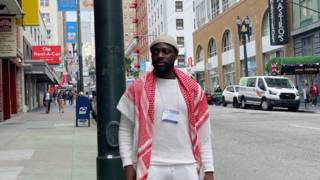
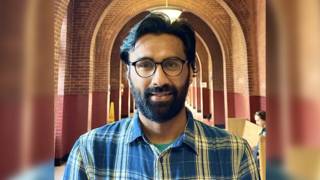
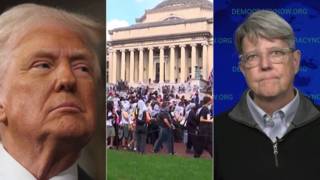
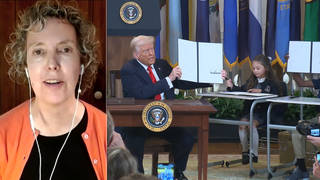





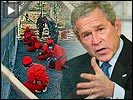
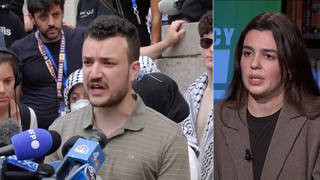
Media Options